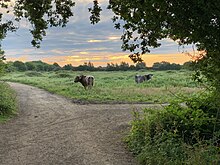
Rewilding Britain is an organisation founded in 2015 that aims to promote the rewilding of Great Britain. [1] [2] It is a registered charity in England, Wales and Scotland. [3] [4]

Rewilding Britain is an organisation founded in 2015 that aims to promote the rewilding of Great Britain. [1] [2] It is a registered charity in England, Wales and Scotland. [3] [4]
One of the people involved in setting up the charity was Guardian journalist and author George Monbiot who published Feral, a book about rewilding, in 2013. [5] Rewilding Britain has called for the reintroduction of predators such as lynx and wolves which were hunted to extinction in Britain centuries ago. [6] Its proposals have been often opposed by farmers. [2]
In 2018 the Prime Minister, Theresa May, launched a 25-year environmental plan which gave encouragement to Rewilding Britain by, for example, supporting the reintroduction of the beaver and recognising the pioneering achievements of the Knepp Wildland in lowland rewilding. [7]
In 2020, Rewilding Britain called for natural regeneration to be incentivised by the future Environmental Land Management Scheme and to be made the default approach to woodland creation unless trees are unable to establish or would take too long to arrive. [8]

The Woodland Trust is the largest woodland conservation charity in the United Kingdom and is concerned with the creation, protection, and restoration of native woodland heritage. It has planted over 68 million trees since 1972. The Woodland Trust has three aims: to protect ancient woodland which is rare, unique and irreplaceable, to promote the restoration of damaged ancient woodland, and to plant native trees and woods to benefit people and wildlife.
The Forestry Commission is a non-ministerial government department responsible for the management of publicly owned forests and the regulation of both public and private forestry in England.

George Joshua Richard Monbiot is a British journalist, author, and environmental and political activist. He writes a regular column for The Guardian and has written several books.
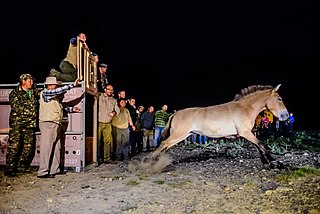
Species reintroduction is the deliberate release of a species into the wild, from captivity or other areas where the organism is capable of survival. The goal of species reintroduction is to establish a healthy, genetically diverse, self-sustaining population to an area where it has been extirpated, or to augment an existing population. Species that may be eligible for reintroduction are typically threatened or endangered in the wild. However, reintroduction of a species can also be for pest control; for example, wolves being reintroduced to a wild area to curb an overpopulation of deer. Because reintroduction may involve returning native species to localities where they had been extirpated, some prefer the term "reestablishment".
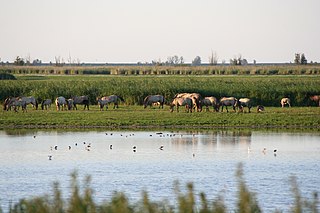
The Oostvaardersplassen is a nature reserve in the Netherlands, managed by the Staatsbosbeheer. Covering about 56 square kilometres (22 sq mi) in the province of Flevoland, it is an experiment in rewilding. It is in a polder created in 1968; by 1989, its ecological interest had resulted in its being declared a Ramsar wetland. It became part of Nieuw Land National Park when that was established in 2018.

Trees for Life is a registered charity working to rewild the Scottish Highlands.

In British folklore and urban legend, British big cats refers to the subject of reported sightings of non-native, wild big cats in the United Kingdom. Many of these creatures have been described as "panthers", "pumas" or "black cats".

Ennerdale is a valley in Cumbria, England. Ennerdale Water, fed by the River Liza, is the most westerly lake in the Lake District National Park.

Pleistocene rewilding is the advocacy of the reintroduction of extant Pleistocene megafauna, or the close ecological equivalents of extinct megafauna. It is an extension of the conservation practice of rewilding, which aims to restore functioning, self-sustaining ecosystems through practices that may include species reintroductions.
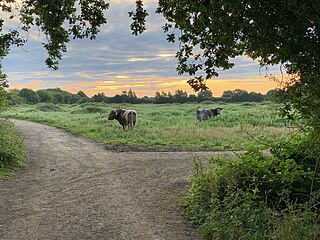
Rewilding is a form of ecological restoration aimed at increasing biodiversity and restoring natural processes. It differs from other forms of ecological restoration in that rewilding aspires to reduce human influence on ecosystems. It is also distinct from other forms of restoration in that, while it places emphasis on recovering geographically specific sets of ecological interactions and functions that would have maintained ecosystems prior to human influence, rewilding is open to novel or emerging ecosystems which encompass new species and new interactions.
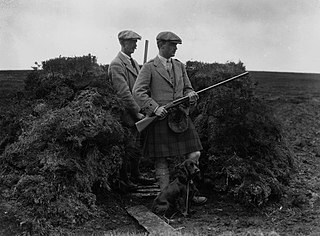
Driven grouse shooting is a field sport in the United Kingdom involving the shooting of red grouse. It is one of two forms of the sport; the other is walked-up shooting. Driven grouse shooting involves grouse being driven to fly over people with shotguns in fixed positions. In walked-up shooting the participants walk forward in a line and flush the birds as they go. Walked-up shooting is more physically demanding than a driven shoot and typically involves fewer birds being shot.

The United Kingdom, being in the British Isles, is ideal for tree growth, thanks to its mild winters, plentiful rainfall, fertile soil and hill-sheltered topography. In the absence of people, much of Great Britain would be covered with mature oaks as well as savannah-type of plains, except for Scotland. Although conditions for forestry are good, trees face threats from fungi, parasites and pests. Nowadays, about 13% of Britain's land surface is wooded. European countries average 39%, but this varies widely from 1% (Malta) to 66% (Finland). As of 2021, government plans call for 30,000 hectares to be reforested each year. Efforts to reach these targets have attracted criticism for planting non-native trees, or trees that are out of place for their surroundings, leading to ecological changes.
Anders Holch Povlsen is a Danish billionaire, CEO and sole owner of the international retail clothing chain Bestseller, a company founded by his parents. He is the largest shareholder in the British internet fashion retailer ASOS and second-largest in German internet clothing retailer Zalando. He is also the largest individual private landowner in the UK.

Feral: Searching for Enchantment on the Frontiers of Rewilding is a 2013 book by the British activist George Monbiot. In it, Monbiot discusses rewilding, particularly in the United Kingdom. It was first published by Allen Lane, a hardback imprint of the Penguin Group. The book received positive critical reviews, and won several awards. It inspired the founding of Rewilding Britain.

The Tree of the Year competition is held in the United Kingdom in autumn each year by the Woodland Trust, a nationwide conservation charity. Nominated trees are shortlisted by a panel of experts, before going to public votes to select a tree of the year for each of the four constituent countries of the United Kingdom. The panel then selects one of these to become Britain's tree of the year and be nominated for the following year's European Tree of the Year. The competition has been run each year since 2014.

The Eurasian beaver has been the successful subject of a century of official and unapproved species reintroduction programs in Europe and Asia. Beavers had been driven to the point of near extinction in Eurasia by humans trapping and hunting them for their meat, fur and castoreum. The reintroductions and conservation led in 2008, to the IUCN assessing the Eurasian beaver as being of "least concern" on its red list.

The Eurasian lynx is the target of ongoing species reintroduction proposals in Great Britain. Proposed locations include the Scottish Highlands and Kielder Forest in Northumberland, England.

"Dinogad's Smock" or "Dinogad's Cloak" is an Old Welsh lullaby recounting the hunting prowess of the dead father of an infant named Dinogad, who is wrapped in a smock made of marten skins. This garment gives the poem its modern title.

Sea rewilding is an area of environmental conservation activity which focuses on rewilding, restoring ocean life and returning seas to a more natural state. Sea rewilding projects operate around the world, working to repopulate a wide range of organisms, including giant clams, sharks, skates, sea sturgeons, and many other species. Rewilding marine and coastal ecosystems offer potential ways to mitigate climate change and sequester carbon. Sea rewilding projects are currently less common than those focusing on rewilding land, and seas are under increasing stress from the blue economy – commercial activities which further stress the marine environment. Rewilding projects held near coastal communities can economically benefit local businesses as well as individuals and communities a whole.